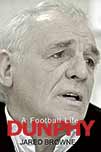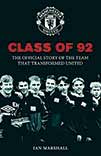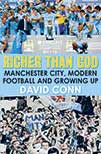{youtube}0Tm-aKQSc_A{/youtube}
Author Archive
Please read the rules and the declaration before submitting your entry. By entering the competition you declare that you have read and agreed to the terms specified in the rules and the declaration.
 A football life
A football life
by Jared Browne
New Island, £14.99
Reviewed by Jonathan O’Brien
From WSC 307 September 2012
At some point in the next few months, we can expect Eamon Dunphy’s memoirs to emerge, a publishing event that is equally likely either to break all Irish bookselling records or sink without trace, so starkly does he polarise opinion in his native land. In the meantime, Jared Browne has stepped into the breach with this diligent but narrowly focused biography of the ageing controversialist.
Dunphy: A Football Life arrives at a moment when, for the first time, the omnipotence of Dunphy’s double act with John Giles on RTE’s football coverage is being openly questioned. Regarded since the mid-1980s as gods of football analysis, they are now frequently accused of laziness, poor preparation and excessive smugness. This isn’t touched upon here, however. Perhaps Browne knows that to have done so would have removed a large part of the rationale for doing the book at all.
As well as being the best-paid journalist in Ireland (he made half a million euros last year), Dunphy is also the most notorious, with a life history speckled by drug use, numerous drink-driving convictions, poisonous running feuds and bully-boy political columns in a Sunday newspaper. But none of that, other than his temporary estrangement from Giles around the 2002 World Cup, is mentioned here. It’s football and football only.
This means that we’re left with a fairly colourless read, albeit a reasonably well-written one. Browne spends too much of this book pushing up the word-count with lengthy digressions on Roy Keane’s managerial career, Jack Charlton’s dinosaur tactics and the inadequacies of the BBC’s pundits. A couple of woeful mistakes slip through the otherwise generally meticulous research: Ireland lost 2-0, not 2-1, to Holland at USA 94, and scored 130 goals, not 75, during Charlton’s decade at the helm.
Browne is no sycophant towards his subject, who he correctly accuses of often self-sabotaging strong arguments by going embarrassingly over the top. But some of his own stances seem a little perverse themselves. There’s a lengthy onslaught on the footballing deficiencies of Mick McCarthy, who Dunphy derided as a player and hated as Ireland manager. Browne goes to the lengths of unflatteringly comparing the man to Paolo Maldini and Fabio Cannavaro, which is hardly fair. Yet Ireland conceded a mere 17 goals in 30 competitive matches with McCarthy in the side, so he must have been doing something right.
At times, adopting an overly formal tone (“Stephen” Staunton, “Josep” Guardiola), the book feels more like an academic paper than a conventioal biography. Browne writes in one not untypical passage: “We must take these concerns seriously and put Dunphy’s views to the test. Was Charlton’s coaching fundamentally flawed and was there a better way for Irish football at this juncture?”
Here and there, the book that instead might have been realised comes bobbing to the surface, not least when Browne correctly and perceptively identifies the “old Ireland v new Ireland” nonsense of the Saipan summer as the pop-psychology drivel that it was. But there’s not enough material like that and, instead, too much aimless strolling down blind alleys, like a very long blog post that’s got way out of hand.
 The official story of the team that transformed United
The official story of the team that transformed United
by Ian Marshall
Simon & Schuster £18.99
Reviewed by Joyce Woolridge
From WSC 307 September 2012
“He’s only tiny; he’s got ginger hair – you’ll probably have a bit of a laugh. But he can’t half play.” Thus Brian Kidd prepared Eric Harrison, Manchester United’s celebrated youth team coach, for the less than auspicious arrival of the young Paul Scholes at the Cliff training ground. Scholes’s success and longevity is perhaps the most remarkable of all the luminaries of the 1992 FA Youth Cup-winning side, which also included Giggs, Beckham, Neville, Butt… and Robbie Savage.
Scholes’s hair colour proved no great problem, but he was tiny, suffering from bronchitis and Osgood Schlatter’s disease which gave him bad knees, and had no real pace and strength. Despite his abundant and obvious skills, just one of these disadvantages should have been enough to ensure that he joined the ranks of the 500 or so boys joining Premier League and Football League clubs at the age of 16 who, according to the PFA’s Gordon Taylor, are out of the game by the time they are 21.
That he was taken on and made it into the first team is testament to the patience and foresight of Harrison, Kidd, Nobby Stiles and Alex Ferguson, though even they would probably have rejected Lionel Messi for being too small.
Few things are as intoxicating for a football fan than the promise of youth. Last season, stories of the emergence of another brood of Fergie’s Fledglings generated the traditional, heady expectations of more “golden apples” among United’s support, providing a welcome distraction from the head-splitting absurdities of Glazernomics.
Ian Marshall’s account duly begins at Moss Lane, Altrincham this January, wondering, with appropriate caution, whether the current crop can follow in the footsteps of their illustrious predecessors – the Busby Babes and the “Class of 92”. Subsequent interesting chapters detail how Stanley Rous inaugurated the Youth Cup in 1952 and how United’s youth “system” pre-dated the war and Busby, who became youth’s most high-profile promoter.
An official United book for sale in the club megastore is hardly going to be shot through with radical revisionism and searing comment, but nevertheless Marshall handles the material skilfully, interweaving the fortunes of the 17 players who made up the squad with a match-by-match account of the 1992 campaign.
Only four of these players dropped out of professional football without making a senior appearance, a remarkable statistic given the high wastage rate which persists in England and demonstrated by an instructive comparison with Crystal Palace, United’s opponents in the final. The ones that got away are inevitably more intriguing, none more so than “local hero” and crowd favourite, Salfordian George Switzer, whose name has become a pub quiz staple.
Concluding chapters take those who survived through to the present, whether to the Treble, global superstardom, down the divisions, into coaching and management or career-ending injuries, revealing a little of the darker side and the many scandalous cruelties of youth football in this country lurking beneath every glittering tale of triumph.
 Manchester City, modern football and growing up
Manchester City, modern football and growing up
by David Conn
Quercus, £16.99
Reviewed by David Stubbs
From WSC 307 September 2012
Guardian contributor David Conn is one of the foremost UK journalists when it comes to football and finance, bringing his legal expertise to bear on the murky and often dubious relationship between the two. In 2008, Manchester City were controversially taken over by Sheikh Mansour bin Zayed of Abu Dhabi, with the club suddenly benefiting from the hundreds of millions he decided to invest in them from afar, despite rarely visiting the Etihad Stadium. The money he has dropped into the game has, many argue, affected it for the worse. David Conn is a Manchester City fan. This book exists within that somewhat awkward triangle.
Richer Than God is not an exposé of dirty, hidden dealings, not least because the Mansour’s takeover is in plain sight. There are no anonymous consortiums or obscure issues of leverage. Nor are there suspicions that the club’s new owner is a chancer, lacking in true financial clout and looking to milk the club or sell off the ground for property development. The Sheikh’s fortunes are too huge for such petty vice.
When Conn puts forward objections to the desirability of a club becoming such a rich man’s plaything, the Sheikh’s representative Khaldoon al-Mubarak “did not so much defend what they were doing as fail to understand the question”, especially with the precedents of Jack Walker and Roman Abramovich already established. What’s the problem?
Conn is further disarmed by the accommodation of the PR-canny new owners. Although he does not get to interview the Sheikh (no one does), there is no attempt to suppress or blank Conn, despite his prominence as an investigative journalist. He’s invited to interview Al-Mubarak, who fields all his questions politely, and to enjoy the lavish hospitality of the “inner sanctum” of the Etihad Stadium.
Conn does not temper his objections, particularly to the social inequality that enabled the Sheikh, and City, to enjoy such largesse. He does, however, find himself concluding that in terms of their provision for the club, their investment not just in players like Carlos Tevez but in its facilities and corporate structure, they are the best owners of the club he has known in his lifetime.
If this sounds disappointing to WSC readers, it should be observed that Richer Than God is an excellent book, which covers a vast range of subject matter, all bolted together with Conn’s typically pertinent grasp of relevant facts and figures. It takes in many things: the often luckless history of Manchester City and the city itself; Conn’s own autobiography as a football fan; the effects of Conservative austerity measures on the city; and, following a terse five-minute interview with ex-chairman Francis Lee, a disillusionment that comes with the knowledge of the chasm between football as a modern-day business and its romantic origins.
Lee taking over City should have been the unifying of these opposites; when he revealed he’d not watched a football game in five years and fired club legends Tony Book and Colin Bell en route to driving the club down two divisions, it turned out otherwise. Although Conn distances himself from some of the more craven gratitude to Mansour, he does identify with a fellow fan, contemplating the club currently: “It isn’t the City I love – but if all this were to happen to anybody, I’m glad it’s happened to us.”